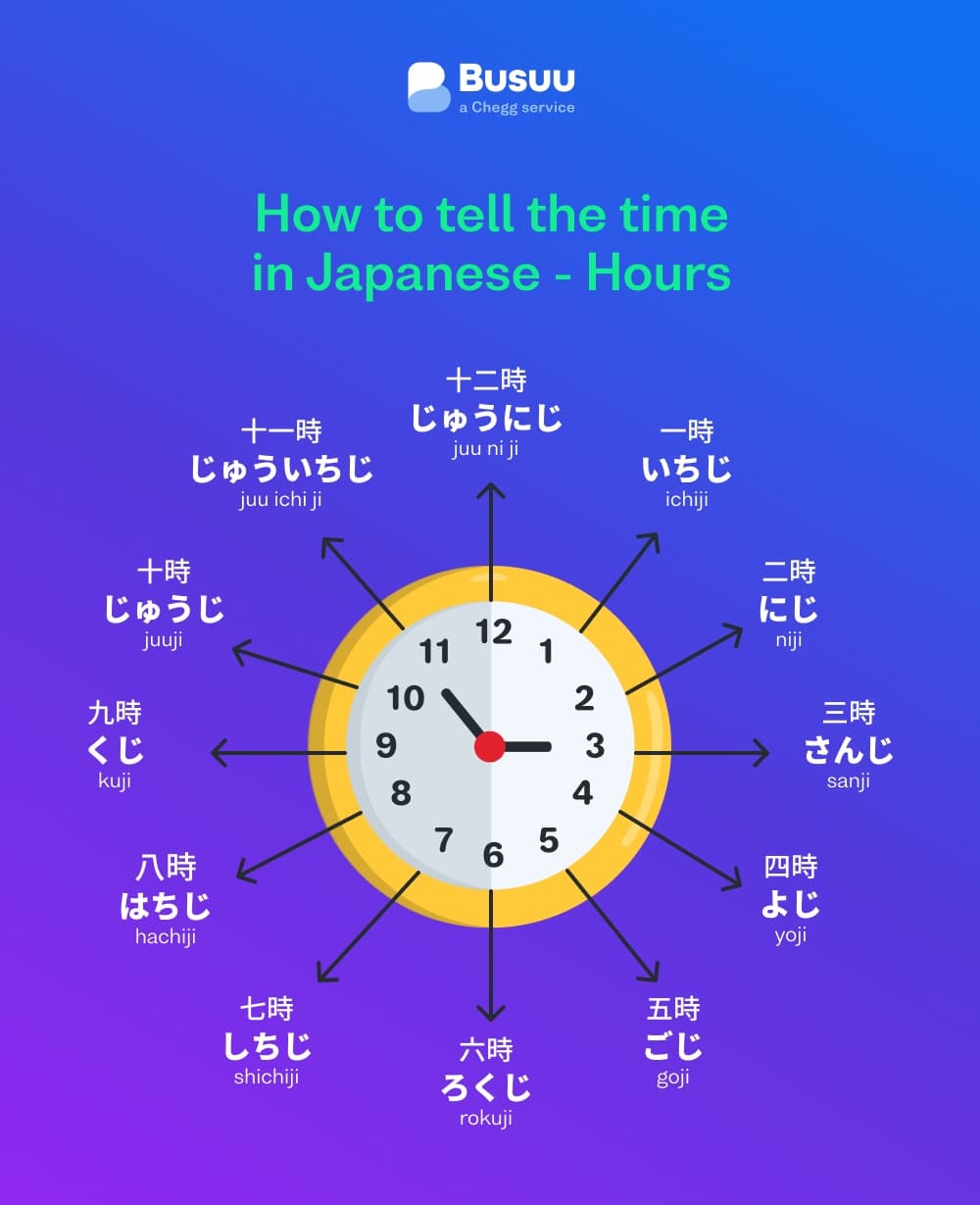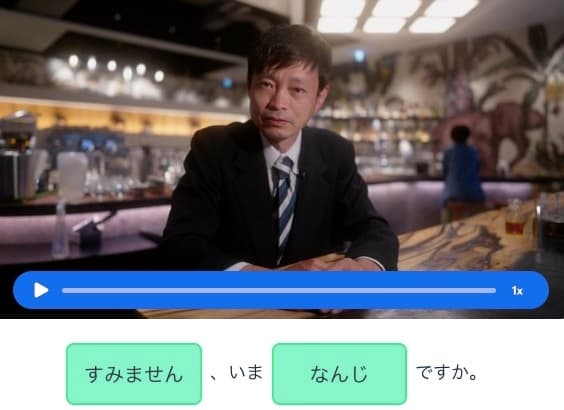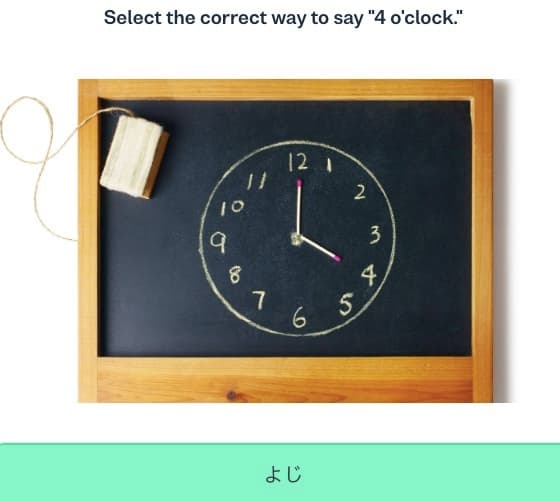I want to learn...
Wondering how to tell the time in Japanese? You’ve come to the right place.
When you’re learning a new language, it’s so important to learn to tell time. How else will you keep appointments? Whether you’re seeing a movie or interviewing for a job, getting the hours and minutes right is a big deal.
The Japanese, like Germans, are famously punctual – so you’ll want to make extra sure you’re saying and understanding the time correctly. Fortunately, we’ve put together this handy guide to help you learn how to talk about time down to the minute.
The basics of telling time in Japanese
The first thing you need to know is the counters or units of measurement used in Japanese to talk about time. In Japanese, like in English, you can use military time (the 24-hour clock) or am and pm to discuss what time you’d like to meet up.
The first words you need to know are jikan – 時間 (じかん), ji – 時 (じ) and fun/pun – 分 (ふん or ぷん).
Talking about time in Japanese
| Kanji | Hiragana | Romaji | Meaning |
|---|---|---|---|
| 時間 | じかん | jikan | number of hours, time (noun) |
| 時 | じ | ji | hours (o’clock) |
| 分 | ふん / ぷん | fun / pun | minutes |
Worth noting
Fun frequently changes to pun because of something called rendaku, which is where a sound sometimes becomes voiced when it is repeated or just because it… sounds right. It’s complicated, this isn’t the time or place to get too far into it, but trust us when we say you’ll want to learn when it’s fun and when it’s pun to be understood, and that eventually you’ll need to tackle the nitty-gritty of rendaku if you want to become fluent in Japanese.
Hours and minutes
The next thing you’ll need to know to competently chat about hours and minutes is how to count to 60 in Japanese! But, assuming you have a little knowledge of Japanese numbers and counting, you’ll be well set up to start telling time.
Here are all of the hours on the 12-hour clock in Japanese and a quick chart showing the basics of how hours work – plus a little refresher on the numbers, just in case. That said, it’s not uncommon to use roman numerals when writing hours and minutes in Japanese.
Japanese hours chart
| Number | Pronounced | Kanji | Time | Pronounced | Hiragana | Kanji |
|---|---|---|---|---|---|---|
| 1 | ichi | 一 | 1 o’clock | ichiji | いちじ | 一時 |
| 2 | ni | 二 | 2 o'clock | niji | にじ | 二時 |
| 3 | san | 三 | 3 o’clock | sanji | さんじ | 三時 |
| 4 | yon/shi | 四 | 4 o’clock | yoji | よじ | 四時 |
| 5 | go | 五 | 5 o’clock | goji | ごじ | 五時 |
| 6 | roku | 六 | 6 o’clock | rokuji | ろくじ | 六時 |
| 7 | shichi/nana | 七 | 7 o’clock | shichiji | しちじ | 七時 |
| 8 | hachi | 八 | 8 o’clock | hachiji | はちじ | 八時 |
| 9 | kyu/ku | 九 | 9 o’clock | kuji | くじ | 九時 |
| 10 | juu | 十 | 10 o’clock | juuji | じゅうじ | 十時 |
| 11 | juu ichi | 十一 | 11 o’clock | juu ichi ji | じゅういちじ | 十一時 |
| 12 | juu ni | 十二 | 12 o’clock | juu ni ji | じゅうにじ | 十二時 |
Take note: 4 o’clock breaks the convention, and 7 o’clock and 9 o’clock require a specific reading of 7 and 9.

Japanese minutes chart
| Minutes | Pronounced | Hiragana | Kanji |
|---|---|---|---|
| 1 minute | ippun | いっぷん | 一分 |
| 2 minutes | ni-fun | にふん | 二分 |
| 3 minutes | san-pun | さんぷん | 三分 |
| 4 minutes | yon-pun | よんふん | 四分 |
| 5 minutes | go-fun | ごふん | 五分 |
| 6 minutes | roppun | ろっぷん | 六分 |
| 7 minutes | nana-fun | ななふん | 七分 |
| 8 minutes | happun | はっぷん | 八分 |
| 9 minutes | kyu-fun | きゅうふん | 九分 |
| 10 minutes | juppun | じゅっぷん | 十分 |
| 15 minutes | juu go-fun | じゅうごふん | 十五分 |
| 20 minutes | ni-juppun | にじゅっぷん | 二十分 |
| 30 minutes | san-juppun | さんじゅっぷん | 三十分 |
| 40 minutes | yon-juppun | よんじゅっぷん | 四十分 |
| 45 minutes | yon-ju go-fun | よんじゅうごふん | 四十五分 |
| 50 minutes | go-juppun | ごじゅっぷん | 五十分 |
Putting it all together
| 1:01 | 一時一分 | いちじいっぷん | ichiji ippun |
|---|---|---|---|
| 12:35 | 十二時三十五分 | じゅうにじさんじゅうごふん | juu ni ji san-juu go-fun |
| 7:23 | 七時二十三分 | しちじにじゅうさんぷん | shichiji ni-juu san-pun |
| 5:10 | 五時十分 | ごじじゅっぷん | goji juppun |
| 8:50 | 八時五十分 | はちじごじゅっぷん | hachiji go-juppun |
You’ll notice that, when talking about time in Japanese, there’s no word for quarter, like we might say “quarter after” or “quarter to” (or “quarter of”, depending on where you’re from). Instead, it’s simply fifteen and forty five. Similarly, there’s no phrase for 5 after.
You can, however, say that it’s X number of minutes before an hour by saying fun mae (分前), mae (前) meaning “before.”
For example:
To say “5 minutes to 8” you’d say…
八時五分前
Hachiji go-fun mae
Breaking that down:
| Kanji: | 八 | 時 | 五 | 分 | 前 |
|---|---|---|---|---|---|
| Hiragana: | はち | じ | ご | ふん | まえ |
| Romaji: | Hachi | ji | go | -fun | mae |
| English: | Eight | o'clock | five | minutes | before |
Still confused? Don’t worry, we’ll put more times into sentences shortly so you can see them in action.
Other time words
While there’s no quarter after, there is a way to say half past in Japanese! Instead of saying 30 minutes, we simply say han (半), meaning half. So 1:30 would be ichiji han, 一時半, no need to add the minutes with fun (分).
But what about all the other words we have that help us talk about time? Those exist in Japanese too. Here are several of the most common ones.
Words to express time in Japanese
| English | Pronounced | Hiragana | Kanji |
|---|---|---|---|
| am | gozen | ごぜん | 午前 |
| pm | gogo | ごご | 午後 |
| noon | shougo | しょうご | 正午 |
| midnight (also used to imply late night) | shinya | しんや | 深夜 |
| morning | asa | あさ | 朝 |
| evening | yuugata | ゆうがた | 夕方 |
| daytime | hiru | ひる | 昼 |
| nighttime | yoru | よる | 夜 |
| sunrise | hinode | ひので | 日の出 |
| sunset | nichibotsu | にちぼつ | 日没 |
The difference between ji and jikan
Wondering when you should use jikan instead of ji? While ji tells you the time, jikan is the word time itself (as in, “I have time tomorrow”), or can refer to a duration. That is, you’d say ji to say “I woke up at 8 o’clock” and jikan to say “I slept for 8 hours.”
How to ask “what time is it?” in Japanese
Now you know just about all the essentials of telling time! Let’s start pulling it all together. First, here’s how you can ask the time (if you happen to be in Japan without a watch).
What time is it?
今何時ですか。
いま なんじ ですか。
_Ima nanji desu ka.
_
And you could answer:
It is 3:15 pm.
午後三時十五分です。
ごごさんじじゅうごふんです。
Gogo sanji juu go-fun desu.
Yes, in this case we say ji instead of jikan. You can think of it as asking for the specific time on the clock rather than the concept of time – or you can just accept that’s how it’s said. Your choice.
Putting it in a sentence
Alright, last but certainly not least, it would probably be helpful to see how time – now that we know how to tell it – fits into a sentence. Let’s take a look at some examples.
I sleep until noon.
私は 正午 まで寝ます。
Watashi wa shoug omade nemasu.
Yuji sleeps for 7 hours.
ゆうじは 七時間 寝ます。
Yuuji wa nana-jikan nemasu.
Dan wakes up at 7 o’clock in the morning.
ダンは 朝 七時 に目を覚ます。
Dan wa asa shichiji ni meosamasu.
School starts at 8:30 am.
学校 は午前 八時三十分 に始まります。
Gakkou wa gozen hachiji san juppun ni hajimarimasu.
He calls at exactly 2:32 in the afternoon.
彼は午後二時三十二分に電話をかけます。
Kare wa gogo niji san-juu ni-fun choudo ni denwa o kakemasu.
Now, you’re ready to start telling the time in Japanese.
Whew! That was a lot, but look at you – you got through it all. Now that we’ve covered all the basics, it’s time to get practicing. Quick, what time is it now?
Newlanguages


